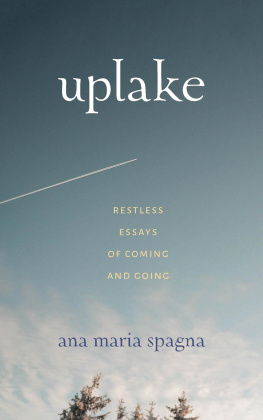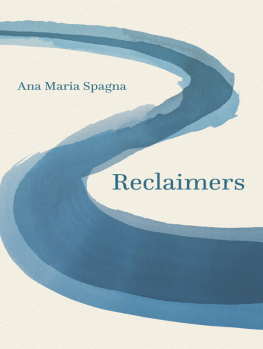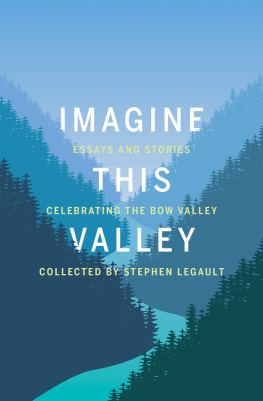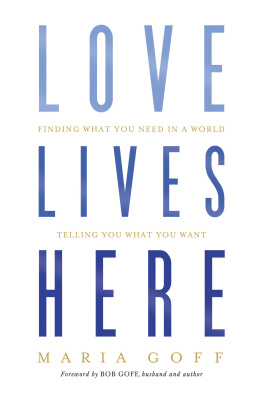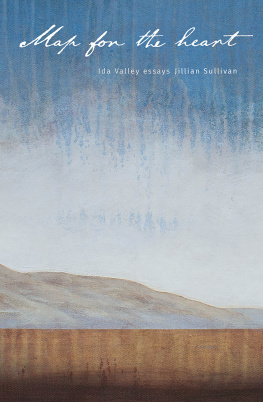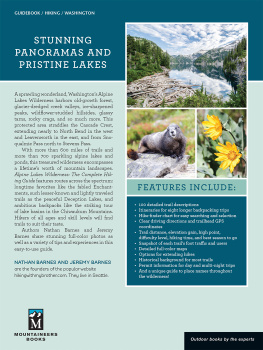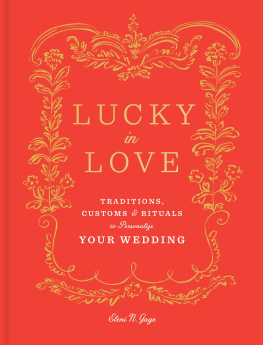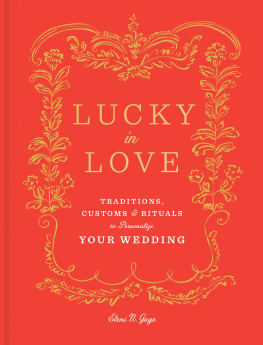
uplake
uplake
RESTLESS ESSAYS OF COMING AND GOING
Ana Maria Spagna
UNIVERSITY OF WASHINGTON PRESS
Seattle
Uplake was published with the support of the Northwest Writers Fund, which promotes the work of some of the regions most talented nonfiction writers and was established through generous gifts from Linda and Peter Capell, Janet and John Creighton, Ruth and Alvin Eller, Michael J. Repass, and other donors.
Copyright 2018 by Ana Maria Spagna
Printed and bound in the United States of America
Design by Katrina Noble
Cover photograph by Michal Janek on Unsplash
Composed in Cassia, typeface designed by Dieter Hofrichter
22 21 20 19 185 4 3 2 1
All rights reserved. No part of this publication may be reproduced or transmitted in any form or by any means, electronic or mechanical, including photocopy, recording, or any information storage or retrieval system, without permission in writing from the publisher.
UNIVERSITY OF WASHINGTON PRESS
www.washington.edu/uwpress
CATALOGING-IN-PUBLICATION DATA IS ON FILE
WITH THE LIBRARY OF CONGRESS.
ISBN 978-0-295-74322-6 ( PBK ), ISBN 978-0-295-74323-3 ( EBOOK )
Belle & Sebastian, "If She Wants Me," words and music by Bob Kildea, Christopher Geddes, Michael Cooke, Richard Colburn, Sarah Martin, Stephen Jackson, and Stuart Murdoch. Copyright 2003 Sony/ATV Music Publishing UK Limited. All rights administered by Sony/ATV Music Publishing LLC, 424 Church St., Ste. 1200, Nashville TN 37219. International copyright secured. All rights reserved. Reprinted by permission of Hal Leonard LLC.
If I could do just one near-perfect thing Id be happy.
Theyd write it on my grave, or when they scatter my ashes.
On second thought Id rather hang about and be there with my best friend
If she wants me.
BELLE & SEBASTIAN

For Laurie
For being there
CONTENTS
uplake
PROLOGUE
Heres a story line. A boy grows up in an idyllic place, a small rural place, the plains of Nebraska, say, or small-town North Carolina. What happens next? He moves away. His new perspective may cause him to grow nostalgic like Jim Burden in My ntonia or world-weary like George Webber in You Cant Go Home Again, but when he returnssophisticated, citified, wizenedhe sees the place anew. Heres another. A woman drops everything to go into the wild, to take a long hike and test her mettle, to confront grief or addiction or depression. What happens next? She moves back to the city, rejuvenated and renewed, and marries and has a family and lives happily ever after. Its the archetypal journey, the stuff of Carl Jung, Joseph Campbell, Northrop Frye, as familiar to usto our collective unconscious, they sayas a three-chord rock song or a five-act play. We anticipate the resolution, the triumphant return, the chorus after the bridge.
Heres another story. A girl grows up in sun-washed suburbs and moves to the woods, not just any woods but the most distant and remote she can find, a place where glaciers still carve and rivers still sculpt and the local black bear population outnumbers the humans. Then she stays.
Thats not a story. Thats stasis. Or maybe its commitment.
Theres a moment at every dinner party when the dreaded questions arise. You begin to sweat because youre about to be introduced as a writer and youre going to have to explain if youve ever been published (you have) and if theyve heard of your books (they havent), or youll be introduced to people who dont yet know youre gay and youll either have to do some fancy pronoun footwork or make a big pronouncement. Those are tough questions, but not as tough, anymore, as when people ask where I live. My home is beautiful. Check that, its way past beautiful; its pristine, spectacular, majestic, maybe even sublime.
Youre so lucky to live there, people say.
I am lucky. But I am also restless. Its easy to get feeling stuck, oppressed, not just by the close valley walls or the long sunless days of winter or even the lack of a grocery store or a library or the chance, ever, for anonymity, but by the stuckness itself. So I fly away. I drive long highway miles. I fantasize about moving. And though my case may be extreme, I suspect Im not alone in this.
The problem with the word commitment is that it sounds so much like work or at least like a conscious decision. What about wonder? The kind that strikes you broadside when you see the first spawning Kokanee shimmering under the surface or the first yellow larch on a ridgetop backlit by sunrise. Theres wonder in the smell of a campfire across the lake; the rolling carpet rump of a bear spooked on a trail run; the half-drunk swoop of pileated woodpeckers; in the way rock spire shadows stretch across a snowy bowl and ice chunks form on the river like floating mirrors, tinkling; and dogwood flowers appear in spring, white and showy, then turn papery and drop. Theres wonder, too, in the sadness when the last maple leaf dangles on a limb and the last seasonal neighbors, bags packed, wait for the ferry. Theres wonder even in the sameness, the plotlines that recur predictable as sitcoms or soap operaswildlife encounters and wild exuberant partiesand those that escalate in the age of climate change: fires and floods, big snows and hot summers.
Meanwhile, each morning I drink coffee and pull on my running shoes. Usually I dont want to go. I tell myself I can skip this one day. Its too cold or too hot or too wet or too dusty. I have work to do. But this is the only meditation practice I have, the dregs of the prayers I was taught as a child. Name what you see. Offer gratitude. Not every story is a circle. Sometimes its just one foot in front of the other.
Slow Connection
THIS MORNING, LIKE MOST MORNINGS, I SIT AT MY DESK in Stehekin gazing out my window and cursing. Make no mistake, theres nothing wrong with the view: a lovely mixed-species forestfir, maple, cottonwood, dogwood, cedarand McGregor Mountain dramatically shadowed with early morning light. The problem is my Internet connection. It used to be fast when we first got hooked up, back when satellite trumped dial-up, then came DSL, then wireless, and websites got snazzier, and our speedy satellite fell behind like a tricycler trying to keep up with the big kids. Some solutions might work: pay for more bandwidth, cut some trees, buy yet another new laptop. Then theres the obvious: shut it off and go outside! I know I should. Instead I sit watching the proverbial pot, drumming my fingers (Come on! Come on!) and considering whats become of me.
Twenty-five years ago, a friend, a man I respected for his kindness, his devotion to his own mountain valleythe Skagit, on the rainy west side of the North Cascadesand its inhabitants, and especially, his willingness to fix my run-down Corolla for cheap, approached me at a memorial service for a mutual friend like an evangelist. His voice dropped with sincerity, his eyes met mine. The answer, he explained, was obvious. The answer to what? I wondered.
He leaned closer.
The Information Superhighway, he said.
I was annoyed. Super annoyed. Maybe I should have seen some humor in the ridiculous Jetson-esque name or the irony of a hippie mechanic espousing it. The Information Superhighway? Who had heard of such a thing?
Well, I had. That was the problem. Id read about so-called modem cowboys snatching up land in the Mountain West with no need to commute, citifying things, sending property taxes skyrocketing. I didnt know what a modem was, exactly, but I knew all about citification since Id grown up in the vast sprawling outer edges of Los Angeles, and Id come to the North Cascades to escape it.
Next page
